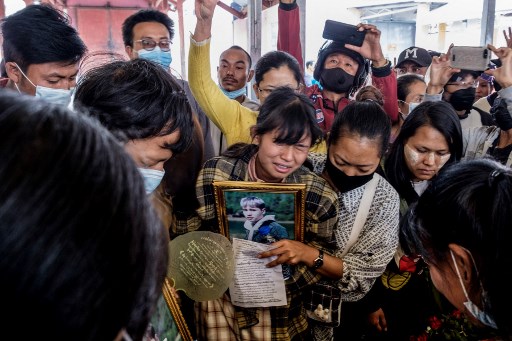
YANGON, Myanmar (AFP) — The death toll in the Myanmar military’s crackdown on protesters has passed 500, as armed rebel groups on Tuesday threatened the junta with retaliation if the bloodshed does not stop.
World powers have ramped up their condemnation of the military’s campaign against the anti-coup movement that is demanding the restoration of the elected government and the release of civilian leader Aung San Suu Kyi.
Washington suspended a trade pact with Myanmar and UN chief Antonio Guterres called for a united global front to pressure the junta after more than 100 protesters were killed in a bloody weekend.
Adding to that pressure campaign, a trio of ethnic rebel groups on Tuesday condemned the crackdown and threatened to fight alongside protesters unless the military reined in its violence.
Daily rallies across Myanmar by unarmed demonstrators have been met with tear gas, rubber bullets and live rounds.
The Assistance Association for Political Prisoners (AAPP) said it had confirmed a total of 510 civilian deaths but warned the true toll was probably significantly higher.
On Tuesday, protesters in Yangon emptied rubbish bags in the streets as part of the latest action.
Rebel warning
Three of the country’s myriad armed ethnic rebel groups — the Ta’ang National Liberation Army, the Myanmar Nationalities Democratic Alliance Army and the Arakan Army (AA) — issued a joint statement threatening retaliation.
“If they do not stop, and continue to kill the people, we will cooperate with the protesters and fight back,” the statement said.
If rebel groups take up arms, Debbie Stothard at the International Federation for Human Rights (FIDH) warned that the situation could degenerate towards civil war.
Two dozen ethnic minority rebellions have flared in Myanmar since independence from British colonial rule in 1948, fighting over autonomy, ethnic identity, drugs and natural resources.
The military has sought to cut deals with some armed groups and earlier this month took the AA off the list of terrorist organisations.
But over the weekend it launched airstrikes in eastern Karen state — the first such strikes in 20 years — targeting the Fifth Brigade of the Karen National Union (KNU) after the group seized a military base.
An estimated 3,000 people fled through the jungle to seek safety across the border in Thailand, according to local groups.
There were reports that some 2,000 people had been pushed back, though the Thai foreign ministry denied this.
Global concern
UN Secretary-General Guterres urged the Myanmar authorities to undertake a “serious democratic transition”.
“It is absolutely unacceptable to see violence against people at such high levels, so many people killed,” Guterres told a news conference.
“We need more unity… (and) more commitment from the international community to put pressure in order to make sure that the situation is reversed,” he said.
US President Joe Biden’s administration announced Monday that the 2013 Trade and Investment Framework Agreement, which laid out ways to boost business but was not a fully fledged deal, would remain suspended until democracy is restored.
“The United States strongly condemns the Burmese security forces’ brutal violence against civilians,” US Trade Representative Katherine Tai said, using Myanmar’s former name of Burma.
Saturday saw the military mark its annual Armed Forces Day with a major parade of troops and armour in the capital Naypyidaw.
But the day also saw repression of protests around the country, with at least 107 people killed, including seven children.
Despite the bloodshed, protesters turned out again on Monday, with mourners at funerals defiantly showing the three-fingered salute that has become emblematic of the movement.
The UN Security Council will meet on Wednesday to discuss the situation, diplomatic sources said, after Britain called for emergency talks.
France condemned the violence as “blind and deadly” and China added its voice to a chorus of international concern on Monday, calling for restraint from all sides.
The Kremlin said it was “very concerned” by growing civilian casualties, despite acknowledging it was building ties with the military authorities.
The US, Britain and the EU have all imposed sanctions in response to the coup and crackdown, but so far diplomatic pressure has not persuaded the generals to ease off.
© Agence France-Presse







